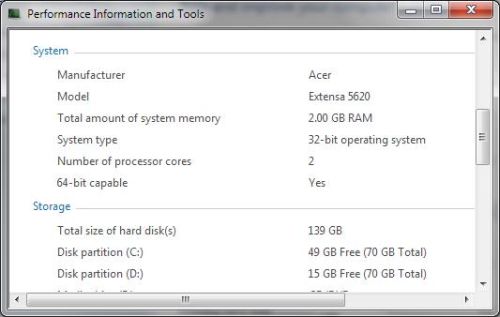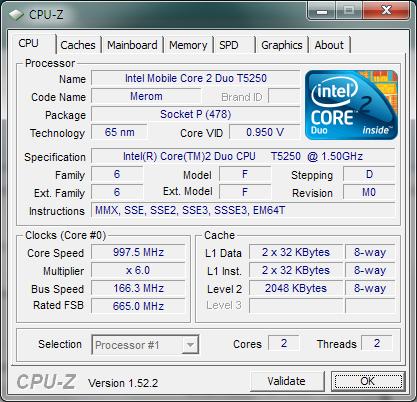The recent official release of the new Microsoft Windows 7 operating system has made a lot of people think about whether or not they should upgrade. When purchasing a new PC, the choice is not that difficult, it will be either Vista or Windows 7, Windows XP is not available anymore. But for existing PC users the upgrade question is quite valid.
 In Windows XP you could use CPU-Z to check the architecture compatibility.
In Windows XP you could use CPU-Z to check the architecture compatibility.
 Check for EM64T or AMD64 in the Instructions line.
Windows 7 is available in 32-bit and 64-bit versions, where the amount of memory (RAM) supported is one of the main differences. But although a 64-bit version supports beyond 4 GB, there are also drawbacks. Applications and device drivers are sometimes not available for or compatible with 64-bit architectures.
Check for EM64T or AMD64 in the Instructions line.
Windows 7 is available in 32-bit and 64-bit versions, where the amount of memory (RAM) supported is one of the main differences. But although a 64-bit version supports beyond 4 GB, there are also drawbacks. Applications and device drivers are sometimes not available for or compatible with 64-bit architectures.
From PCAUTORITIES.com ( Thanks )
Windows 7 Hardware Compatibility
One of the main considerations should be the compatibility of your PC. If you are running Windows Vista, your PC will almost certainly also run Windows 7 smoothly. But if you are still running an older Windows version, like Windows XP, the performance and compatibility of your PC’s hardware should be checked. As a first step, simply download and run the Windows Upgrade Advisor. This Microsoft program checks your PC hardware and tells you whether your PC is ready for Windows 7. Also consider if your PC is 64-bit compatible. In Vista you can use the System Performance Information to check if your PC is 64-bit capable. Simply click the View and print detailed performance and system information link. In Windows XP you could use CPU-Z to check the architecture compatibility.
In Windows XP you could use CPU-Z to check the architecture compatibility.
 Check for EM64T or AMD64 in the Instructions line.
Windows 7 is available in 32-bit and 64-bit versions, where the amount of memory (RAM) supported is one of the main differences. But although a 64-bit version supports beyond 4 GB, there are also drawbacks. Applications and device drivers are sometimes not available for or compatible with 64-bit architectures.
Check for EM64T or AMD64 in the Instructions line.
Windows 7 is available in 32-bit and 64-bit versions, where the amount of memory (RAM) supported is one of the main differences. But although a 64-bit version supports beyond 4 GB, there are also drawbacks. Applications and device drivers are sometimes not available for or compatible with 64-bit architectures.
Windows 7 Benefits
One of the main reasons to upgrade to Windows 7 is to ensure continued support from Microsoft. As most people will know, Microsoft does not support Windows XP anymore. Another reason to consider Windows 7 is the new user interface. If you did not upgrade to Windows Vista because of the many bad experiences with Vista at the start, you might want to skip Vista and go to Windows 7 now. The graphical user interface will take some time to get used to, but has many new features that are targeted at easy-of-use and efficiency. The network configuration is a lot easier than in Vista, jump lists give you quick access to files, locations and functions that are frequently used on a per application basis. If you are into movies and music, Windows 7 has a great new feature to enable media sharing. Media streaming allows you to distribute your multimedia files across your network, to any compatible device. One big advantage over Vista is that the presence of the User Account Control function is reduced a lot. In Vista most people turned the UAC off to get rid of the annoying confirmation messages, but in Windows 7 Microsoft limited the number of actions that require user confirmation. The drawback of course is that this also reduces the level of safety that was intended to be achieved with the UAC.Windows 7 Drawbacks
As with Vista, users will find that Windows 7 requires a higher performing system than Windows XP. So if you are running Windows XP on an older PC, upgrading might not be possible (or desirable) without upgrading some of your hardware. Program compatibility can still be an issue with Windows 7. Although a lot of the major software manufacturers have already released updated versions for Windows 7, not all software will be compatible with Windows 7. The compatibility mode can help in some cases. Device drivers are another aspect that can limit your hardware compatibility in Windows 7. Again, most manufacturers have created Windows 7 compatible drivers, and Windows 7 does support more hardware than Vista by default, but exotic devices and older devices might not be supported (yet). For XP users, the main drawback will be that you can not upgrade from XP to Windows 7 directly. You need to do a clean install of Windows 7. Windows Easy Transfer that is available on the Windows 7 CD can help you migrate your user files, but you will need to reinstall all your applications.Conclusion
It is obvious that there are multiple aspects to consider whether to upgrade or not. How and for what you use your computer determines if the Windows 7 upgrade is useful, or should perhaps be postponed a little longer. If you do plan to switch over to Windows 7, make sure to plan it well. Make a backup, run the upgrade advisor, check the Windows 7 compatibility center and use the Easy Transfer option to move your data over. When done installing Windows 7, do not forget to download and install Windows Live Essentials to add the email support and messenger program.From PCAUTORITIES.com ( Thanks )














0 comments
Post a Comment